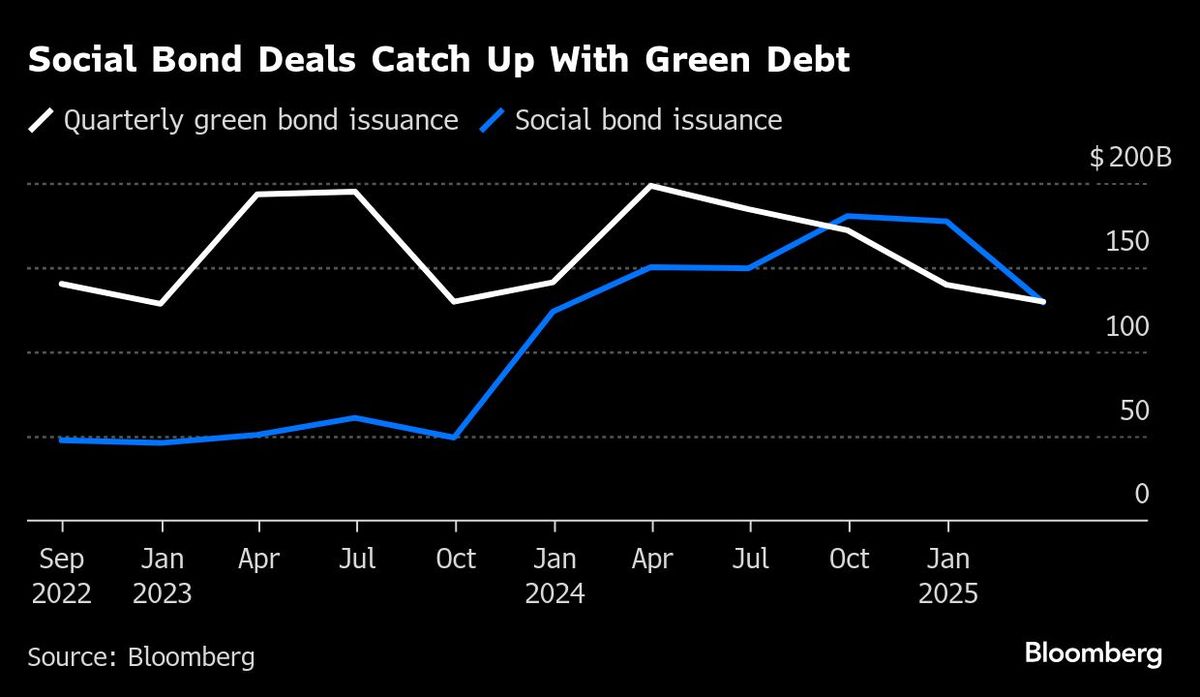
(March 24): A US$1.8 trillion (RM7.99 trillion) corner of the sustainable debt market is defying the wider downturn, as investors snap up bonds largely sold by US government agencies, even as Donald Trump leads a green retreat.
Sales of so-called social bonds, which direct proceeds to areas like health, housing and education, jumped about 130% to US$657 billion globally last year, and continued at a similar pace in the first quarter, according to data compiled by Bloomberg Intelligence. Issuance now rivals the traditionally larger market for green bonds, the data show.
Social bonds have emerged as a shelter of sorts for environmental, social and governance (ESG) investors, as climate-related issues become increasingly contentious with Trump pulling green funding and promoting fossil fuels. The bonds now have US$1.8 trillion outstanding, compared with green bonds at US$3.9 trillion.
The flow of social bond deals may continue “even if there is a backtrack on some climate commitments,” said Ulf Erlandsson, chief executive officer of Anthropocene Fixed Income Institute, a non-profit that promotes debt markets to mitigate climate change. Still, given the notes are based more on social constructs than science, there are risks the debt is “even more politically sensitive” in the US, he added.
Ironically, the surge in social bond sales has been largely driven by a US agency. The Government National Mortgage Association, known as Ginnie Mae, broadened its debt programme, allowing it to sell more debt for projects aimed at low-income households and veterans, among other groups. It also retroactively labelled some existing securities as social bonds in 2023, boosting the issuance total.
The US housing agencies have been responsible for a majority of this year’s US$149 billion in new deals, with Ginnie Mae accounting for almost two-thirds of that. Fannie Mae and Freddie Mac have issued a combined US$13.2 billion.
France’s social debt fund, along with International Finance Corp and Korea Housing Finance Corp, have also sold debt this year. Banks underwriting social bond deals include JPMorgan Chase & Co and BNP Paribas SA.
Ginnie Mae is one of several government agencies targeted for cost cuts by the Trump administration, raising concerns about possible disruption in the mortgage bond market, Bloomberg News reported last month. As many as a quarter of the agency’s 270-or-so employees have either resigned or been dismissed, people familiar with the matter said at the time.
Ginnie Mae hasn’t replied to a request for comment.
Social bonds took off during the pandemic to support small- and medium-sized enterprises, with government and supranational entities dominating sales. Housing is the most common use of proceeds because it’s pretty easy to identify, said Nneka Chike-Obi, head of Asia-Pacific ESG ratings and research at Sustainable Fitch in Hong Kong.
The debt also is posting solid returns for investors. The ICE Social Bond Index has outperformed its green bond peer this year with a 3.4% gain.
Earlier this month, Standard Chartered Plc issued a €1 billion (US$1.1 billion) social bond for the first time to lend to small firms, including women-owned businesses across Asia, Africa and the Middle East. Citigroup Inc said it expects social-finance funding in Asia to rise by more than 10% this year, as investor demand increases.
“Given the high frequency of issuance, this allows investors more engagement opportunities, thus impacting an issuer’s cost of capital,” said Shamil Gohil, co-manager of Fidelity International’s social bond fund. He said many social bonds are high quality, with more than half rated AA or higher.
Financing gap
The United Nations estimates that there’s an annual financing gap of about US$4 trillion to achieve sustainable development globally, as poorer countries lack resources for education, healthcare and social protection. Asia Pacific, where a majority of countries are considered emerging markets, accounted for only US$7.6 billion of the sales this year.
Still, more social investments may flow to developing countries as large asset managers expand by acquiring stakes or buying impact-investing funds, said Jeffrey Lee, senior vice-president at Moody’s Ratings. In January, London-based Foresight Group Holdings Ltd acquired impact investor WHEB Asset Management LLP.
“That might not change the numbers in terms of the issued amount dollar sizes, but the number of transactions might get more and more popular in frontier and emerging markets,” he said.
Uploaded by Liza Shireen Koshy
- Powerful quake in Southeast Asia kills several, 81 trapped in Bangkok building rubble
- Genting says Nevada authorities have signed off settlement terms for Las Vegas complaint
- CK Hutchison will not sign deal to sell strategic Panama ports next week — Reuters
- Businessman who assaulted bodyguards for fasting sentenced to six years and 10 months' jail
- Foreign investors shifting to safer Malaysian assets amid market volatility — analyst

